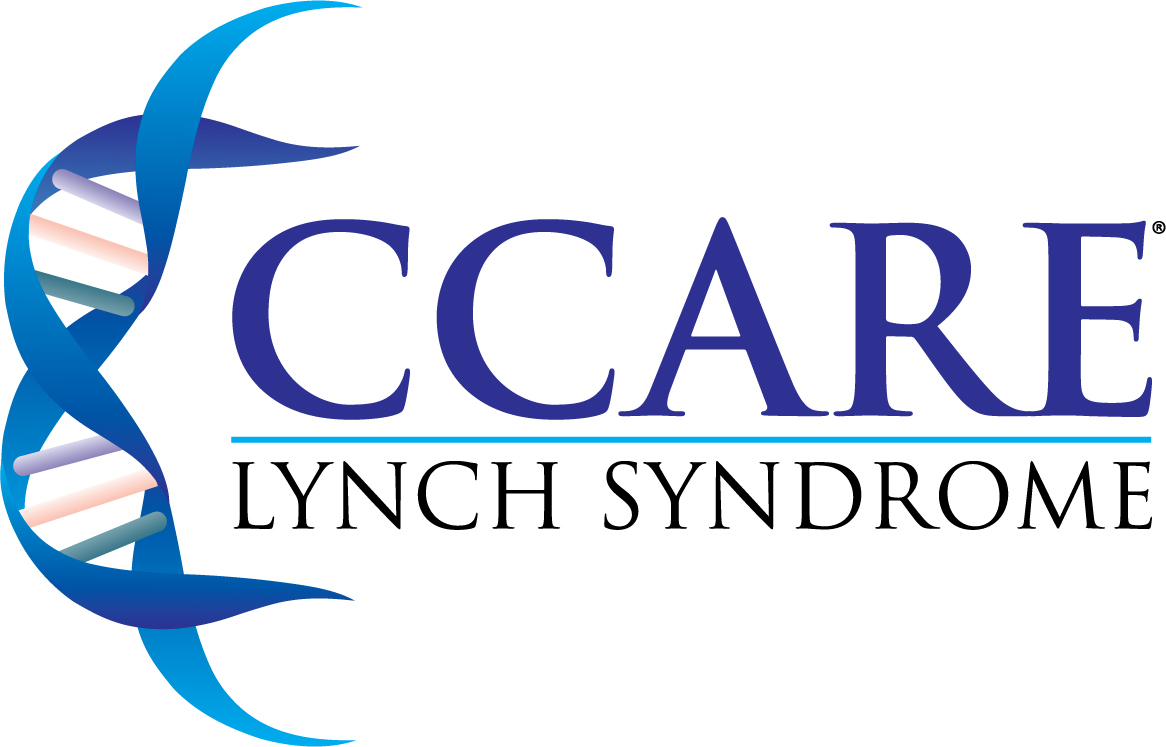Physician and Healthcare Provider Information
Lynch Syndrome
In both men and women, colorectal cancer is the third most commonly diagnosed cancer in the United States. Each year almost 150,000 people are diagnosed with it, but the second most common cause of cancer deaths, with over 50,000 individuals will die from colon cancer. 25% of individuals diagnosed with colon cancer have a significant family history of cancer and approximately 1 in every 35 colon cancer patients have Lynch Syndrome. The rate of Lynch syndrome in the population is 1:279, with approximately 1.2 million people in the United States. Unfortunately 95% of these people are not aware they have it.
Lynch Syndrome is an autosomal dominant hereditary colon cancer Syndrome cause by mutations in 1 of 4 mismatch repair genes (MLH1, MSH2, MSH6 and PMS2). These are genes that help repair damage to other genes. If this damage is not repaired, the cell may die or grow uncontrolled. The latter option is the cause of cancer.
Important Note
In 2024, according to the American Cancer Society, 152,810 people are expected to be diagnosed with colorectal cancer, and 53,010 people will die from it. Earlier diagnoses leads to lower cancer stage and a higher survival.
Lynch syndrome dramatically increases the risk of colon cancer. The lifetime risk estimates are up to 74% for men and 52% for women. However, the risk changes based on the specific subtype. Lynch syndrome also increases the risk of other cancers. The most common is endometrial with up to a 71% lifetime risk. This includes endometrial adenocarcinoma, clear cell carcinoma, uterine papillary serous carcinoma and malignant mixed Mullerian tumors. Lynch Syndrome is also associated with cancers of the stomach (6-9%), small intestine (3-4%), hepatobiliary (1%), brain (2-3%), ovary (6-12%), ureter and renal pelvis (3-8%), pancreas (1-4%), and sebaceous gland neoplasms (1-9%). The average age of onset of colon cancer in Lynch Syndrome is estimated to be 42 to 61 compared to 71 in the general population. The types of cancers and age of onset varies by the different subtypes.
A history of colon polyps warrants increased screening if these polyps are adenomatous rather than hyperplastic. While colon polyps normally grow slowly, in Lynch Syndrome, adenomas may rapidly transform into a cancerous growth. Colon cancers due to Lynch Syndrome are also frequently found on the right side of the colon. With the aggressiveness of Lynch Syndrome cancers, all suspicious lesions must be biopsied in a timely manner. For these reasons, Hemoccults, flexible sigmoidoscopies, barium enemas, and virtual colonoscopies are inappropriate screening tests for Lynch Syndrome. Instead, yearly colonoscopies are indicated for Lynch Syndrome patients at a much earlier age.
Risk of Cancers by Subtype
Each of the subtypes, MLH1, MSH2, PMSH6, and PMS2 has a different lifetime risk of cancers. To help determine the specific risk for an individual a large database of Lynch syndrome patients has been created. This is known as the Prospective Lynch Syndrome Database (PLSD). The PLSD website shows the cumulative risk for each specific subtype (MLH1, MSH2, PMSH6, and PMS2), by sex, and by organ (colon, endometrium, ovaries, prostate, urinary bladder, kidney/ureter, stomach/intestine/ pancreas, breast, and brain). The PLSD website is very easy to use and provides good data that is updated on a regular basis.
Another great source of information is the National Comprehensive Cancer Network (NCCN). The charts listed below is from their most recent guidelines Version 3.2024 from October 31, 2024.
MLH1 Lynch Syndrome Cancer Risks
| Site | Average Age of Presentation | Risk MLH1 Lynch Syndrome by age 80 | Risk through lifetime for General Population |
| Colorectal | 44 years | 46%–61% | 4.1% |
| Endometrial | 49 years | 34%-54% | 3.1% |
| Ovarian | 46 years | 4%-20% | 1.1% |
| Renal pelvis / ureter | 59-60 years | 0.2%-5% | Not available |
| Bladder | 59 years | 2%-7% | 2.3% |
| Gastric | 52 years | 5%-7% | 0.8% |
| Small bowel | 47 years | 0.4%-11% | 0.3% |
| Pancreas | No data | 6.2% | 1.7% |
| Biliary tract | 50 years | 1.9%-3.7% | Not available |
| Prostate | 63 years | 4.4%-13.8% | 12.6% |
| Brain | No data | 0.7%-1.7% | 0.5% |
MSH2 and EPCAM Lynch Syndrome Cancer Risks
| Site | Average Age of Presentation | Risk MSH2 and EPCAM Lynch Syndrome by age 80 | Risk through lifetime for General Population |
| Colorectal | 44 years | 33-52% | 4.1% |
| Endometrial | 47-48 years | 21%-57% | 3.1% |
| Ovarian | 43 years | 8%-38% | 1.1% |
| Renal pelvis / ureter | 54-61 years | 2.2%-28% | Not available |
| Bladder | 59 years | 4.4%-12.8% | 2.3% |
| Gastric | 52 years | 0.2%-9.0% | 0.8% |
| Small bowel | 48 years | 1.1%-10% | 0.3% |
| Pancreas | No data | 0.5%-1.6% | 1.7% |
| Biliary tract | 57 years | 0.02%-1.7% | Not available |
| Prostate | 59-63 years | 3.9%-23.8% | 12.6% |
| Brain | No data | 2.5%-7.7% | 0.5% |
MSH6 Lynch Syndrome Cancer Risks
| Site | Average Age of Presentation | Risk MSH6 Lynch Syndrome by age 80 | Risk through lifetime for General Population |
| Colorectal | 42-69 years | 10%-44% | 4.1% |
| Endometrial | 53-55 years | 16%-49% | 3.1% |
| Ovarian | 46 years | <1%-13% | 1.1% |
| Renal pelvis / ureter | 65-69 years | 0.7%-5.5% | Not available |
| Bladder | 71 years | 1.0%-8.2% | 2.3% |
| Gastric | 2 Cases 45 & 81 | <1%-7.9% | 0.8% |
| Small bowel | 54 years | <1%-4% | 0.3% |
| Pancreas | No data | 1.4%-1.6% | 1.7% |
| Biliary tract | No data | 0.2%-<1% | Not available |
| Prostate | 63 years | 2.5%-11.6% | 12.6% |
| Brain | 43-54 years | 0.8%-1.8% | 0.5% |
PMS2 Lynch Syndrome Cancer Risks
| Site | Average Age of Presentation | Risk PMS2 Lynch Syndrome by age 80 | Risk through lifetime for General Population |
| Colorectal | 61-66 years | 8.7%-20% | 4.1% |
| Endometrial | 49-50 years | 13%-26% | 3.1% |
| Ovarian | 51-59 years | 1.3%-3% | 1.1% |
| Renal pelvis / ureter | No data | <1%-3.7% | Not available |
| Bladder | 71 years | <1%-2.4% | 2.3% |
| Gastric | Inadequate Data | Inadequate Data | 0.8% |
| Small bowel | Single Case age 59 | 0.1%-0.3% | 0.3% |
| Pancreas | No data | <1%-1.6% | 1.7% |
| Biliary tract | No data | 0.2%-<1% | Not available |
| Prostate | No data | 4.6%-11.6% | 12.6% |
| Brain | 40 years | 0.6%-<1% | 0.5% |
National Comprehensive Cancer Network Guidelines Version 2.3004, Genetic/Familial High-Risk Assessment: Colorectal, Endometrial, and Gastric






